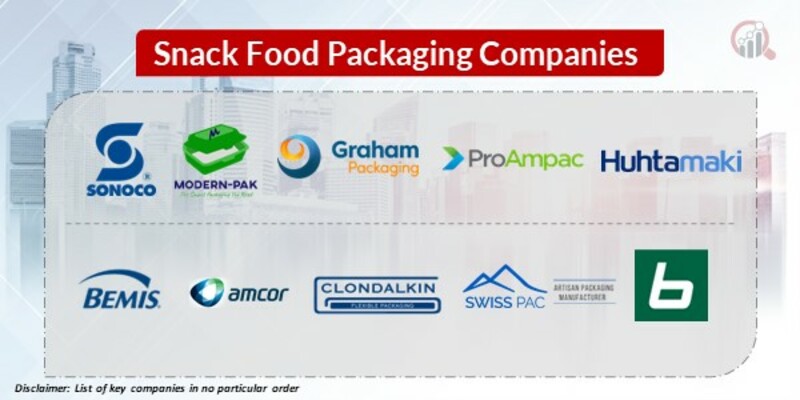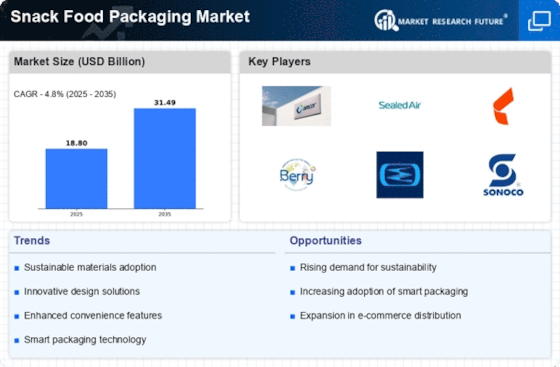Top Industry Leaders in the Snack food Packaging Market

The snack food packaging market is a dynamic and ever-evolving ecosystem, driven by evolving consumer preferences, technological advancements, and environmental concerns. It's a lucrative space for established giants and emerging players alike. Understanding the competitive landscape is crucial for navigating this market successfully.
Market Share Strategies:
-
Innovation & Differentiation: Standing out in a crowded market requires constant innovation. Amcor, for instance, developed its AmLite™ HeatSeal pouch, offering improved sustainability and performance. Sealed Air, on the other hand, focuses on resealable packaging solutions, catering to on-the-go consumers. -
Sustainability Focus: Consumers are increasingly demanding eco-friendly packaging. Mondi, a major player, invests heavily in recyclable and compostable materials like paper and bioplastics. Huhtamaki prioritizes renewable resources in its packaging solutions. -
Vertical Integration: Integrating upstream and downstream operations offers cost advantages and control over the supply chain. Sealed Air's acquisition of Liqui-Box and Reynolds Consumer Products strengthens its position in both flexible and rigid packaging segments. -
Strategic Partnerships: Collaborations with snack food manufacturers and retailers can open new markets and distribution channels. Amcor's partnership with PepsiCo for sustainable packaging solutions is a prime example.
Factors Influencing Market Share:
-
Packaging Type: Pouches and bags currently dominate, but boxes are gaining traction due to their premium feel and recyclability. Rigid plastics still hold a significant share due to their durability and barrier properties. -
Material Choice: Sustainability concerns are driving demand for paper, bioplastics, and compostable materials. However, cost and performance considerations still favor traditional plastics in some segments. -
Regional Trends: The Asia Pacific region is witnessing the fastest growth due to rising disposable incomes and urbanization. North America and Europe remain mature markets, but still see innovations in convenience and portion control packaging.
List of the Key Companies in the Snack Food Packaging market include
- Sonoco Products (US)
- Modern-Pak Pte Ltd (US)
- Graham Packaging Holdings (US)
- ProAmpac (US)
- Huhtamaki (Finland)
- Bemis Company (US)
- Amcor (Australia)
- Clondalkin Group (the Netherlands)
- Swiss pack private limited (India)
- Bryce Corporation (US)
- Sealed Air Corporation (US)
- American Packaging (US)
Recent Developments:
May 2021: Amcor will offer Designed-to-Be-Recycled Meal Packing in Colombia in May 2021. The redesigned sachet is recyclable in compliance with industry standards. The sachets are the most recent in a succession of recyclable and other environmentally friendly packaging solutions.
June 2018: Bemis introduced transparent, reusable stand-up bag packaging in June 2018. The solution blends reusable substances with shelf-appealing openness, assisting CPGs in attracting customers while meeting their business's environmental goals.
February 2017: Clondalkin introduced a new stand-up pouch with an increased shelf life in February 2017. Combining carefully chosen materials and micro-perforation helps the goods within breathe and stay fresher for longer. The packaging increases the duration of storage of the fruit and keeps them crisp for twelve days after harvest.
April 2022 there have been massive changes experienced within the packing industry over the past couple years due to an increasing number of start - ups across the world, emergence new types of foodstuffs and non-food products and high demand for food and drinks during pandemic periods. Similarly, during pandemic period more people around globe were buying supplies hence raising high demand on food industry. This resulted into a rapid increase in demand for packaging. Furthermore, since the advent of flexible packaging, several manufacturers across the globe have embraced its many advantages such as cost-effective production and product promotion resulting from its use in packing.
In October 2022, Mars, Incorporated, a US-based food company, launched a new KINDR snack bar packaging. The new KINDR snack bar packaging incorporates recycled content made from advanced recycling, meaning it contains less virgin plastic than previous products. This new material has been completely redesigned to maximize circularity and is produced through the recycling of used mixed plastics that would otherwise be incinerated or sent to landfills.
Also in May 2021, Switzerland’s Amcor launched a recycled food packaging for powdered chocolate in Colombia. The novel package solution follows recycling standards set by the industry. With this newer method applied, when the package is recycled there will be a 53% reduction in environmental impact (mainly carbon) while water use will have dropped by around 84%.










